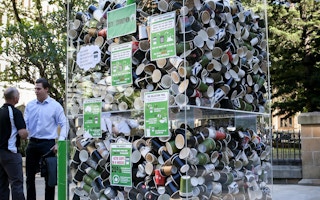Australians love their coffee, but their caffeine habit comes with a high environmental price as every discarded takeaway cup ends up in the country’s landfills and stays there for decades.
To continue reading, subscribe to Eco‑Business.
There's something for everyone. We offer a range of subscription plans.
- Access our stories and receive our Insights Weekly newsletter with the free EB Member plan.
- Unlock unlimited access to our content and archive with EB Circle.
- Publish your content with EB Premium.
But this could soon change, thanks to an Australian waste management company’s successful first step towards opening a dedicated takeaway coffee cup recycling facility in the country.
Melbourne-headquartered Closed Loop Environmental Solutions (Closed Loop) on Thursday announced the end of a four-week pilot to provide bins where office workers in Sydney, Melbourne, and Brisbane could toss their used coffee cups.
The University of Queensland estimates that more than 1 billion paper coffee cups are produced every year in Australia, but they are not suitable for recycling as cardboard since the liquid-proof liner found in most cups causes them to be treated as contaminants in the paper recycling stream.
As a result, they are landfilled and take about 50 years to decompose.
Closed Loop, however, has collaborated with researchers in the United Kingdom to develop a technology that can recycle the cups. Called Simply Cups, the technology can turn used paper cups into new plastic compounds, without having to separate the paper and plastic components.
The new compounds, known as polymers, can be used to make trays, place mats coasters, and other items. In the UK, Closed Loop has recycled more than 7 million cups through this initiative.
Robert Pascoe, managing director, Closed Loop, explained in a statement that the biggest hurdle to recycling coffee cups is separating the containers from other waste streams.
The trial was carried out to make a case for a special coffee cup recycling facility in Australia, he added.
To gauge whether consumers would take the effort to deposit their cups in dedicated bins, Closed Loop installed coffee cup collection bins in three buildings in the country, one each in Sydney, Melbourne, and Brisbane. It collected 12,000 coffee cups over the four-week period, with 4,278 of them coming from Sydney.
“The trial has shown that coffee drinkers will use an alternative bin for takeaway cups,” said Pascoe. “Coffee cups can be collected separately using a clean, simple, and efficient system.”
“
If a dedicated facility was set up, tens of millions of cups could be diverted from landfill every year.
Robert Pascoe, managing director, Closed Loop Environmental Solutions
The Sydney trial was supported with a A$17,500 grant from the City of Sydney, and was conducted at law firm Herbert Smith Freehills; the cups collected were used as an exhibit in the city center.
A City of Sydney spokesperson told Eco Business that the company will temporarily store the cups collected from the trial for further public displays, and they will then be sent offshore for recycling.
Clover Moore, Lord Mayor of the City of Sydney, noted that if the trial was replicated at offices across just the 26.5 square km of area that the City of Sydney governs, “we could divert more than 25 million coffee cups from landfill every year”.
It is likely that if the bins were installed in public places as well as in commercial areas, this figure would be even higher.
Following the conclusion of the trial, Closed Loop will conduct further research into logistical and economic factors to make a business case for a recycling facility.
Pascoe added: “If a dedicated facility was set up, tens of millions of cups could be diverted from landfill every year.”
Environmental group Greenpeace Australia Pacific acknowledged that recycling is better than litter or landfill but ultimately, disposable items are still a problem.
A Greenpeace spokesperson said: “Disposable coffee cup bins are nice, but don’t address the root cause of the problem.” Producing new cups still requires natural resources such as oil and wood to make the paper; and the cups are still potential sources of polluting garbage.
Multiple-use coffee cups are a much better option, he added. “Taxing and/or charging extra money for disposable cups could help put an end to their use and encourage the ‘keep cup’ trend.”










